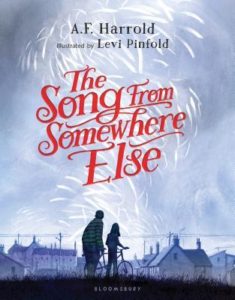
A. F. Harrold
Illustrated by Levi Pinfold
Bloomsbury USA Children’s
Published July 4, 2017

Amazon | Barnes & Noble | Goodreads
About The Song from Somewhere Else
Frank thought her summer couldn’t get any worse–until big, weird, smelly Nick Underbridge rescues her from a bully, and she winds up at his house.
Frank quickly realizes there’s more to Nick than meets the eye. When she’s at his house, she hears the strangest, most beautiful music, music which leads her to a mysterious, hidden door. Beyond the door are amazing creatures that she never even dreamed could be real. For the first time in forever, Frank feels happy . . . and she and Nick start to become friends.
But Nick’s incredible secrets are also accompanied by great danger. Frank must figure out how to help her new friend, the same way that he has helped her.
My Review
The Song From Somewhere Else has this charming, other-worldly feel to it. The story is a little bit dark, which may make it too much for younger, more sensitive readers. It reminded me a little bit of Roald Dahl in the sense that it has a dark edge to it, if that makes sense.
I loved the unlikely friendship between Frank and Nick. Nick was totally my hero from the moment he stepped onto the page. I loved getting to know his family and watching Frank learn how wrong first impressions and rumors can be. Her struggle with the neighborhood bullies also felt really authentic. I loved that she has a moment where she has to decide whether to treat one bully the way he has treated her or to put aside his cruelty and treat him differently. Those are tough choices.
The pen and ink illustrations in the book are amazing, too. They definitely captured that other-worldly feeling in the story. Also, I have to say I loved the cat and its awesome name—Quintilius Minimus!
Imaginative readers will find the out-of-the-box story appealing. Fans of books about friendship and overcoming the powerless feeling of being bullied will love Frank’s heart and her unexpected journey of friendship.
Cultural Elements
Takes place in England.
Profanity/Crude Language Content
None.
Romance/Sexual Content
None.
Spiritual Content
Nick’s basement contains a door to another world with mythical creatures, good and bad. Frank encounters shadows that have the power to hurt people in her world. Frank’s cat talks to her.
Violent Content
Boys bully Frank on the playground, tossing her bag into a patch of stinging thorns. It’s clear this is a pattern, and Frank feels powerless to stop them. She wrestles with this feeling throughout the story. Frank finds a couple of people who’ve been attacked by shadows. (She doesn’t witness the actual attack.)
Drug Content
None.